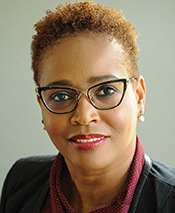The Future of Learning is Now
By Agnes Francis Adolphine
Foundational Principles to Invigorate your Learning Culture
Adult learning principles used to engage technical professionals in continuous development, upskilling, motivation, and learning application are the foci for invigorating learning cultures in corporate environments. Field technicians throughout the telecommunications industry confront the need to reskill and retool to meet the demands of the workforce of the future and adapt to the network evolution and deployment of new platforms. When overlayed with the demand to attain 21st century skills, field technicians may become overwhelmed. However, there is good news! Foundational principles of adult learning have remained constant for centuries despite technological advancements and disruption. The willingness and ability to adapt to changing skill needs are essential to remaining career-relevant and accountable to one’s individual development. How can front-line employees navigate this change? How do learning leaders sustain a robust transition to hybrid learning strategy while resisting the risk of overwhelming employees? These are all questions that industry leaders are trying to address as our world continues to encounter accelerated disruption.

Johansen, B. (2020) asserts that the future of work presents uncertainty and technological disruption.Ormrod, J. E. (2020) foreshadowed the Fourth Industrial Revolution (4IR) change acceleration by conveying that transformative learning in the workplace has similarities and differences with organizational change. Agola, E. A. (2020) provides evidence that the individual and system-wide foci required to cultivate skills of the future and transform the workforce will require employees to guide their individual development leveraging self-directed learning (SDL) strategies and rewards. To elevate the autonomy and accountability of front-line employees, application of balanced extrinsic and intrinsic educational principles contributes to elevated employee engagement, leading to optimal business results. Connors et al (2010) indicate that heightened accountability generates a cycle of investment that employees can encode in their memory schemas, thus building resiliency at the individual and organizational levels.
Operation leaders, learning leaders and technical employees seeking to upskill, reskill and remain relevant to the changing needs driven by the 4IR should embark on a journey to coach and motivate their teams using new tools and adult learning theories to navigate a volatile uncertain complex and ambiguous world (VUCA). Seminal work by researchers focused on self-regulation (SR), SDL and efficient memory strategies suggests that these are evergreen strategies that can reinvigorate both the learner and organizational learning culture. Such learning strategies are adopted by organizations to navigate accelerated change. Additionally, learning leaders can embrace SDL, SRL and brain science to ignite learning agendas, evaluate impact, and achieve consistent executive support for field technicians thereby invigorating accountability.
Five key adult learning principles that continue to invigorate the learning culture for technical front-line professionals are as follows:
- Accountability/Autonomy — Connors, R. et al (2010) postulate the power of individuals and organizations to embrace the model of accountability which is to “See It, Own It, Solve It, and Do It.” The power of adults to naturally exert autonomy and embrace charting their own path is a source of empowerment that drives a culture of continuous learning and growth. Accountability is essential to creating results. This principle has strong ties to field technicians’ ability to learn in the flow of work and readily apply leanings to installing and troubleshooting network issues.
- Self-Directed Learning — Merriam & Bierema (2014) convey that andragogy and SDL were two of the earliest and more robust concepts of the nature of adult learners. SDL covers the process of how adult learners navigate their learning to gain knowledge, become autonomous, inspire transformational learning, and become emancipatory. One of the myths of SDL is that it is in isolation but learning huddles and group learning refresh sessions are powerful forms of using self-direction to upskill resources.
- Transformative Learning — Transformational or transformative learning are often used interchangeably and has replaced andragogy as the dominant philosophy of adult education. There is a journal dedicated to this method of learning and it is often connected with igniting organizational change (Merriam & Bierema, 2014).
- Integrated Levels of Adult Motivation — Wlodkowyski (2008) offers two assumptions of learning and motivation: If something can be learned, it can be learned in a motivational way and every instructional plan need a motivational plan. Four intersecting motivational conditions cited as essential according to Wlodkowyski (2008) include: establishing inclusion, developing attitude, enhancing meaning, and engendering confidence. (Merriam & Bierema, 2014) recommends using learning contracts to engender learner-engagement and foster learners’ personal accountability and ownership of their learning success.
- Memory Storage and Retrieval — According to (Merriam & Bierema, 2014), memory is historically referred to as a computer, comparing memory to input, throughput and output. More recently, memory is divided into sensory, working, and long-term memory. Learning leaders’ knowledge of memory and retrieval will continue to aid in efficient learning strategy and knowledge transfer to front-line learners by layering in micro performance learning boosts to mitigate the risk of the forget curve.
Our world will continue to encounter uncertainty and accelerated change. Ongoing disruption coupled with the convergence of technology and human capabilities, require learning as a key focus for organizations that seek to attract and retain competitive talent. Focused attention to these five learning principles in a VUCA world will anchor learners to actions that are within their control. These principles will enable field technicians to take control of their continued development. Further, learning practitioners and operational leaders should work side by side to determine how to seamlessly infuse these principles into overall learning and performance plans for their teams. Intentional focus on invigorating a learning culture requires intention and inspiration to cross the chasm into a sustainable hybrid learning ecosystem where everyone can thrive.
References
Agola, E. A. (2020). An Analysis of the Effect of Digital Badging on Workplace Self-Directed E-Learners’ Achievement, Persistence, and Self-Regulation. ProQuest
Elliot, B. L. (2021). Motivated Memory: Structural and Neural Correlates. ProQuest
Carter, D. (2017). Creativity in action — the information professional is poised to exploit the fourth industrial revolution: The business information survey 2017. Business Information Review, 34(3), 122–137. https://doi.org/10.1177/0266382117722440
Connors, R., Smith, T., & Hickman, C. (2010). The oz principle: Getting results through individual and organizational accountability. Penguin Group.
Familiar, A. (2021). Learning About Others Dynamically Changes Behavior and the Brain [Ph.D., University of Pennsylvania]. https://www.proquest.com/docview/2572604751/abstract/55E2709288A420FPQ/1
Fleming, D., Artis, A., & Hawes, J. (2014). Technology perceptions in employees’ use of self-directed learning. Journal Of Services Marketing, 28(1), 50–59. https://doi.org/10.1108/JSM-03-2012-0062
Johansen, B. (2020). Full-Spectrum Thinking. Berrett-Koehler.
Merriam, S. B., & Bierema, L.L. (2014). Chapter 8. Adult learning: Linking theory and practice. John Wiley and Sons.
Markiewicz, J. (2021). Screens in the Field: Using Digital Technology to Foster Learning and Sense of Place [M.S., Michigan State University]. ProQuest https://www.proquest.com/docview/2572536416/abstract/D3FD0B9111D64EEAPQ/1
Ormrod, J. E. (2020). Chapter 15. In Human learning. essay, Pearson.

Agnes Francis Adolphine,
Field Operations and Construction,
Cox Communications
Agnes has been in the telecoms industry since 2013, supporting major network systems integration and learning transformation initiatives at Cox Communications. Currently, she is responsible for all technical learning for field operations and construction in support of Cox’s network infrastructure investment, with key partnerships across 21 markets. She holds more than 20 years of progressive leadership experience with deep expertise in technology, business development, program management and learning & organizational development.
Shutterstock



